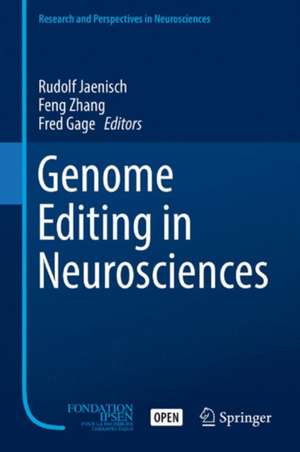Genome Editing in Neurosciences: Research and Perspectives in Neurosciences
Editat de Rudolf Jaenisch, Feng Zhang, Fred Gageen Limba Engleză Hardback – 22 sep 2017
CRISPR-Cas9 is a rapid, efficient, versatile and relatively cheap method for dissecting the molecular pathways that are the basis of life, as well as for investigating and potentially rectifying faults in these pathways that result in disease.
This book reviews how CRISPR-Cas9 and other genome editing techniques are advancing our understanding of development and function in the nervous system, uncovering the molecular causes of neurological disorders and providing tools for gene therapy.
Din seria Research and Perspectives in Neurosciences
- 18%
 Preț: 944.99 lei
Preț: 944.99 lei - 18%
 Preț: 938.83 lei
Preț: 938.83 lei - 18%
 Preț: 941.68 lei
Preț: 941.68 lei - 18%
 Preț: 1218.21 lei
Preț: 1218.21 lei - 18%
 Preț: 945.92 lei
Preț: 945.92 lei - 5%
 Preț: 1403.44 lei
Preț: 1403.44 lei - 18%
 Preț: 1215.70 lei
Preț: 1215.70 lei - 5%
 Preț: 711.72 lei
Preț: 711.72 lei - 18%
 Preț: 944.36 lei
Preț: 944.36 lei - 18%
 Preț: 936.95 lei
Preț: 936.95 lei - 18%
 Preț: 944.19 lei
Preț: 944.19 lei - 15%
 Preț: 638.89 lei
Preț: 638.89 lei - 18%
 Preț: 945.62 lei
Preț: 945.62 lei - 15%
 Preț: 636.63 lei
Preț: 636.63 lei - 15%
 Preț: 636.63 lei
Preț: 636.63 lei - 18%
 Preț: 886.62 lei
Preț: 886.62 lei - 15%
 Preț: 635.47 lei
Preț: 635.47 lei - 15%
 Preț: 636.30 lei
Preț: 636.30 lei - 15%
 Preț: 635.65 lei
Preț: 635.65 lei - 15%
 Preț: 636.12 lei
Preț: 636.12 lei - 24%
 Preț: 734.67 lei
Preț: 734.67 lei -
 Preț: 422.31 lei
Preț: 422.31 lei - 18%
 Preț: 937.41 lei
Preț: 937.41 lei
Preț: 517.17 lei
Preț vechi: 544.38 lei
-5% Nou
Puncte Express: 776
Preț estimativ în valută:
98.96€ • 103.53$ • 82.21£
98.96€ • 103.53$ • 82.21£
Carte tipărită la comandă
Livrare economică 03-17 aprilie
Preluare comenzi: 021 569.72.76
Specificații
ISBN-13: 9783319601915
ISBN-10: 3319601911
Pagini: 137
Ilustrații: XI, 123 p. 16 illus. in color.
Dimensiuni: 155 x 235 mm
Greutate: 3.32 kg
Ediția:1st ed. 2017
Editura: Springer International Publishing
Colecția Springer
Seria Research and Perspectives in Neurosciences
Locul publicării:Cham, Switzerland
ISBN-10: 3319601911
Pagini: 137
Ilustrații: XI, 123 p. 16 illus. in color.
Dimensiuni: 155 x 235 mm
Greutate: 3.32 kg
Ediția:1st ed. 2017
Editura: Springer International Publishing
Colecția Springer
Seria Research and Perspectives in Neurosciences
Locul publicării:Cham, Switzerland
Cuprins
Introduction.- In vitro modeling of complex neurological diseases.- Aquatic model organisms in neurosciences : the genome editing revolution.- Genome-wide genetic screening in the mammalian CNS.- CRISPR/Cas9-mediated Knockin and Knockout in Zebrafish.- Dissecting the role of synaptic proteins with CRISPR.- Recurrently Breaking Genes in Neural Progenitors: Potential Roles of DNA Breaks in Neuronal Function, Degeneration and Cancer.- Neuroscience research using non-human primate models and genome editing.- Multiscale genome engineering: Genome-wide screens and targeted approaches.- Using Genome Engineering to Understand Huntington’s Disease.- Therapeutic gene editing in muscles and muscle stem cells.
Notă biografică
Rudolf Jaenisch, MIT Cambridge, USA
Feng Zhang, MIT Cambridge, USA
Fred Gage, Salk Institute for Biological Studies, La Jolla, CA, USA
Textul de pe ultima copertă
This book is open access under a CC BY 4.0 license.
Innovations in molecular biology are allowing neuroscientists to study the brain with unprecedented resolution, from the level of single molecules to integrated gene circuits. Chief among these innovations is the CRISPR-Cas genome editing technology, which has the precision and scalability to tackle the complexity of the brain. This Colloque Médecine et Recherche has brought together experts from around the world that are applying genome editing to address important challenges in neuroscience, including basic biology in model organisms that has the power to reveal systems-level insight into how the nervous system develops and functions as well as research focused on understanding and treating human neurological disorders.
Innovations in molecular biology are allowing neuroscientists to study the brain with unprecedented resolution, from the level of single molecules to integrated gene circuits. Chief among these innovations is the CRISPR-Cas genome editing technology, which has the precision and scalability to tackle the complexity of the brain. This Colloque Médecine et Recherche has brought together experts from around the world that are applying genome editing to address important challenges in neuroscience, including basic biology in model organisms that has the power to reveal systems-level insight into how the nervous system develops and functions as well as research focused on understanding and treating human neurological disorders.
Caracteristici
Highlights how genome editing is enabling breakthroughs in how we study the brain Identifies a powerful method to understand and treat central nervous system disorders Reveals system-level insight into how the nervous system develops and functions Includes supplementary material: sn.pub/extras
